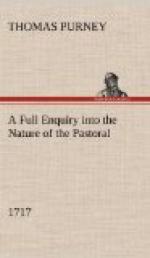A Sublime Image always dilate’s and widen’s the Mind, and put’s it upon the Stretch. It comprehends somewhat almost too big for it’s Reach; and where the Mind is most stretch’d, the Image is most Sublime; if we consider no foreign Assistances. As Homer say’s, The Horses of the Gods, sprung as far at every Stride, as a Man can see who sit’s upon the Sea-shore. But foreign Assistances, as a figurative Turn, &c. may raise a passage to an equal degree of Sublimity, which yet does not so largely dilate the Mind; as this of Shakespear’s is more Sublime than that of Homer’s.
—Heaven’s
Cherubs, hors’d
Upon the sightless Curriers of
the Air,
Shall blow the horrid Deed in every Eye.
Macbeth. Act. 1. Scen. 7
The not having a perfect Idea of the Sentiment, make’s us conceive something the greater of it.
A Sublime Thought always gives us a greater and more noble Conception of either the Person speaking; the Person spoken of; or, the Thing spoken of. I need not instance; but if you apply this to any of the Thoughts of Homer, or Shakespear, generally call’d Sublime, you’ll find it will always square.
Here let me make one Observation: That you may never be mistaken in judging of a Sublime Passage, Cubbin, take notice; that there are some Thoughts so much imaged in the Turn that is given to ’em, by the figurative Expression, that they lose the name of Thoughts, and commence Images. I will mention one out of Shakespear, (who uses this Method the most of any Author, and ’tis almost the only thing that raises his Language) I will mention it, because, being in it self a low and common Sentiment, he has made it the most Sublime, I think, of any he has. Macbeth’s Lady say’s, before the Murther of the King.
—Come,
thick Night.
And pall thee in the dunnest Smoak of
Hell,
That my keen Knife see not the Wound it
makes
Nor Heav’n peep thro’ the
Blanket of the Dark,
To cry, Hold! Hold!
Macbeth Act. 1. Scen. 5.
But I run the Digression too far.
CHAP. II.
Of the Images. And which are proper for Pastoral, which not.
Let us proceed to consider what Images will shine most in PASTORAL. And here I shall not consider all kinds of Images, both good and vicious, but only those which are in their own nature good; and among those show which may, and which may not, be introduc’d into Pastoral.
Of Images, in their own Nature good, only the BEAUTIFUL, and the [A]GLOOMY are, properly speaking, fit for Pastoral. The Uncommon, the Terrible, and the Sublime, being improper.
[Footnote A: The Division of the Images and Thoughts is made, and the nature of the GLOOMY consider’d, in the Critical Preface to the Second Part of our Pastorals.]




